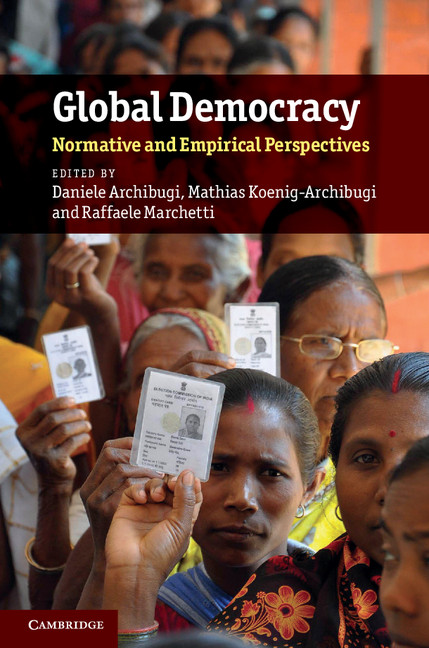Global Democracy
Democracy is increasingly seen as the only legitimate form of government, but few people would regard international relations as governed according to democratic principles. Can this lack of global democracy be justified? Which models of global politics should contemporary democrats endorse and which should they reject? What are the most promising pathways to global democratic change? To what extent does the extension of democracy from the national to the international level require a radical rethinking of what democratic institutions should be? This book answers these questions by providing a sustained dialogue between scholars of political theory, international law, and empirical social science. By presenting a broad range of views by prominent scholars, it offers an in-depth analysis of one of the key challenges of our century: globalizing democracy and democratizing globalization.
- A comprehensive resource on the key issues in the current debate about global democracy
- Brings together some of the most advanced and significant recent scholarship on the theme of global democracy with chapters by some of the most prominent and innovative thinkers on the subject
- Addresses topics that are subject to intense public attention and debate, such as the future of international cooperation and the implications of globalization for human security and welfare
Reviews & endorsements
“Is global democracy a chimera, an oxymoron, or a utopia? The wide-ranging views in this book are essential reading for those seeking answers—opponents resisting the move beyond individual states as well as for proponents looking for future pathways toward supranational governance with fewer political inequalities.”
– Thomas G. Weiss, Presidential Professor of Political Science, The Graduate Center, The City University of New York
“This is an ambitious, well conceived, and important book that brings together normative and empirical perspectives on the notion of Global Democracy. The best scholars in the field illuminate the need to democratize international authority and analyze both the opportunities and limits of such an endeavor.”
– Michael Zürn, Director, The Social Science Research Center Berlin (WZB), and Professor for International Relations, Free University of Berlin
Product details
March 2012Adobe eBook Reader
9781139180368
0 pages
0kg
This ISBN is for an eBook version which is distributed on our behalf by a third party.
Table of Contents
- 1. Introduction: mapping global democracy Daniele Archibugi, Mathias Koenig-Archibugi and Raffaele Marchetti
- 2. Models of global democracy: in defence of cosmo-federalism Raffaele Marchetti
- 3. Citizens or stakeholders? Exclusion, equality and legitimacy in global stakeholder democracy Terry Macdonald
- 4. Is democratic legitimacy possible for international institutions? Thomas Christiano
- 5. Cosmopolitan democracy: neither a category mistake nor a categorical imperative Andreas Follesdal
- 6. Regional versus global democracy: advantages and limitations Carol C. Gould
- 7. Towards the metamorphosis of the United Nations: a proposal for establishing global democracy Tim Murithi
- 8. Flexible government for a globalized world Bruno S. Frey
- 9. Global democracy and domestic analogies Mathias Koenig-Archibugi
- 10. Global democracy for a partially joined-up world: toward a multi-level system of public power and democratic governance? Kate Macdonald
- 11. Civil society and global democracy: an assessment Jonas Tallberg and Anders Uhlin
- 12. Global capitalism and global democracy: subverting the other? B. S. Chimni
- 13. From peace between democracies to global democracy Daniele Archibugi
- 14. The promise and perils of global democracy Richard A. Falk.
















